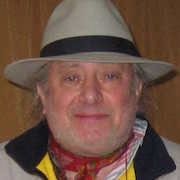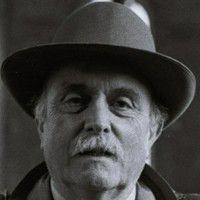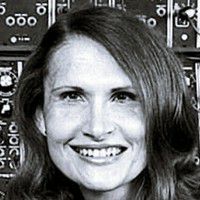Tod Dockstader (March 20, 1932 – February 27, 2015) was an American composer of electronic music, and particularly musique concrète.
Dockstader was born in Saint Paul, Minnesota, United States. He studied painting and film while at the University of Minnesota, before moving to Hollywood in 1955, to become an apprentice film editor. He moved into work as a sound engineer in 1958, and apprenticed at Gotham Recording Studios, where he first started composing. Around this same time he also worked for Terrytoons alongside Gene Deitch. From 1961 to 1962, when Deitch directed thirteen new Tom and Jerry shorts, Dockstader was responsible for creating the unusual, heavily reverberated sound effects heard throughout them; he also wrote the shorts Mouse into Space and Landing Stripling.
Dockstader's first record, Eight Electronic Pieces, was released in 1960, and was later used as the soundtrack to Federico Fellini's Fellini Satyricon (1969). He continued to create music throughout the first half of that decade, working principally with tape manipulation effects. In 1966 Owl Records released four albums of his work from this period including what many consider to be Dockstader's masterpiece, Quatermass. He achieved modest recognition and radio play alongside the likes of Karlheinz Stockhausen, Edgard Varèse, and John Cage.
In 1961, he applied to use the facilities at the Columbia-Princeton Electronic Music Center and was denied access in separate rejection letters penned by Vladimir Ussachevsky and Milton Babbitt. Ussachevsky’s official reason was the “overstrained” scheduling of the studios, although many suspect that Dockstader’s lack of academic training was a factor in the decision. After leaving Gotham Recording Studios in the late 1960s he formed the audio-visual service Westport Communications Group along with business partner, and former Gotham executive, Fred Hertz. The company focused on corporate clients and produced award-winning educational films for the American Heritage series.
Dockstader was also a prolific writer, with several articles published by Electronic Music Review and The Musical Quarterly.
In the early 1990s, Starkland re-released most of the content of Dockstader’s out-of-print Owl records, along with previously unreleased material. The two CDs brought new, significant acclaim to the composer. The Washington Post called Dockstader "a highly imaginative pioneer," and The Wire concluded, "The obsessive care with which Starkland have compiled these extraordinary recordings should ensure that Dockstader will be remembered as the innovative, visionary figure he undoubtedly was." Reinvigorated, Dockstader returned to music at the start of the 21st century, adopting computer composition in favor of tapes. New CDs appeared from Sub Rosa and ReR Megacorp.
Work on a documentary about his life, Unlocking Dockstader, was begun in 2011, however lack of funding has stalled the project.
He died in Arlington, Massachusetts, on February 27, 2015, at the age of 82.
In 2016, Starkland released From the Archives, a CD that premiered 15 works selected from the unexpected discovery of 4,200 sound files found on Dockstader's private computer after his death. Created from 2000-2008, these were among the last pieces composed by Dockstader, before dementia put an end to his studio work.









